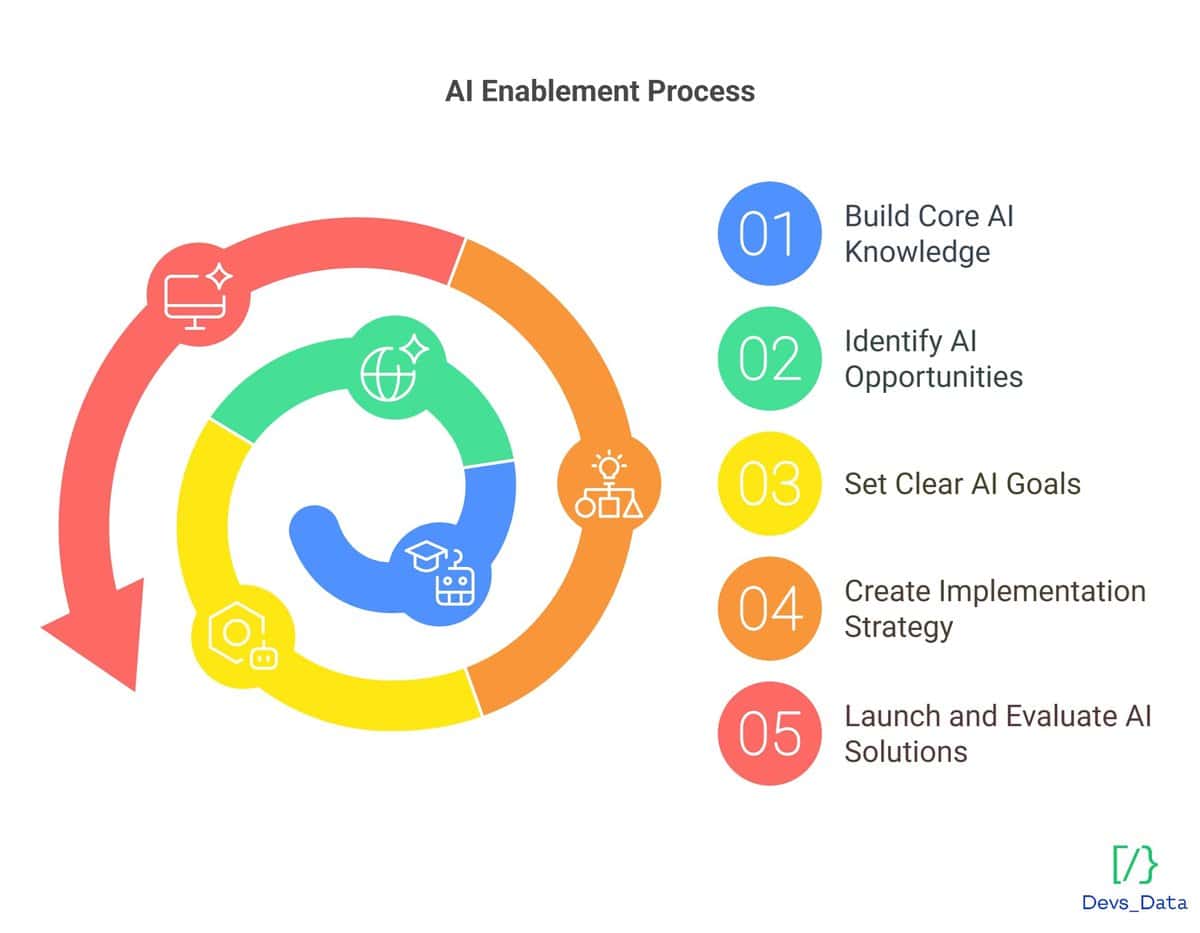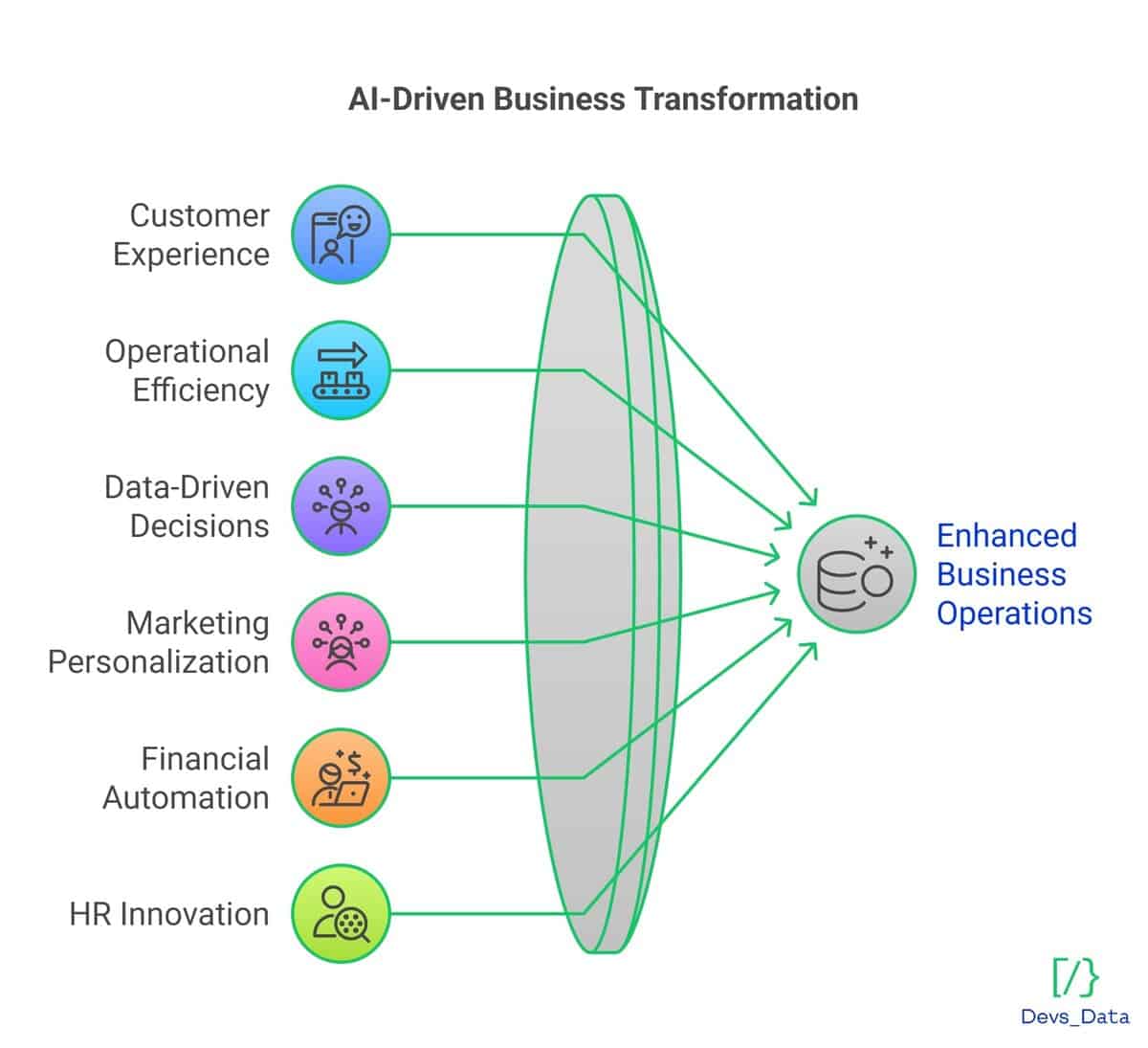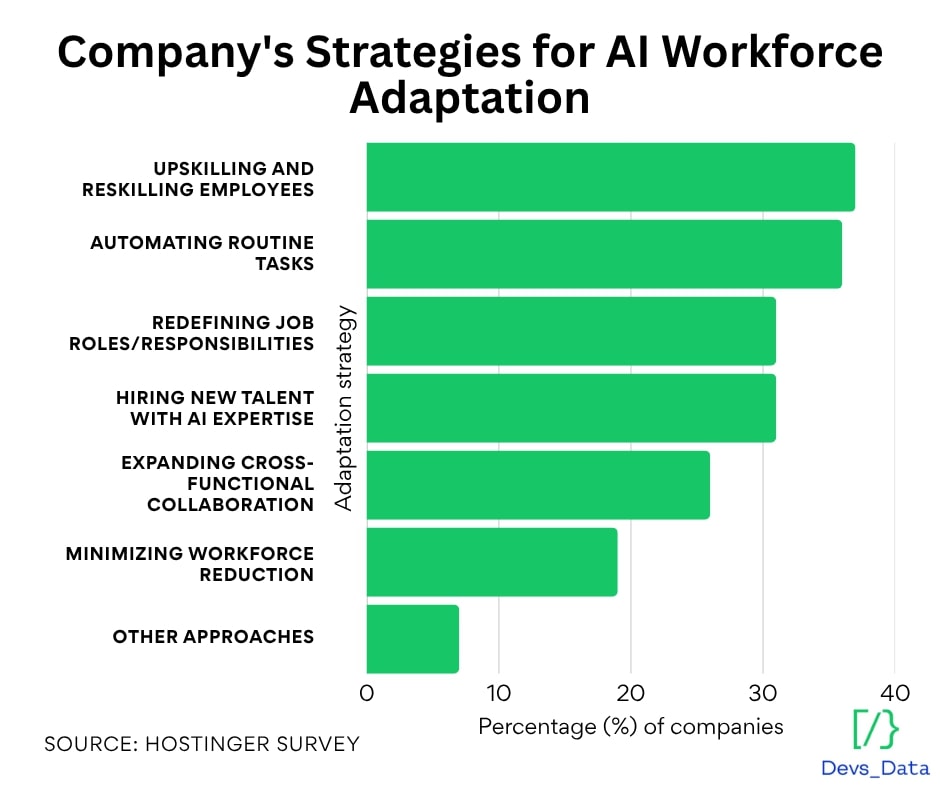


Artificial intelligence transforms business operations by streamlining processes, automating routine tasks, and unlocking unprecedented opportunities for growth. From enhancing customer experiences through personalized interactions to optimizing supply chains with predictive analytics, AI enables organizations to achieve superior performance while reducing operational costs.
“Recent data reveals a dramatic surge in AI adoption, with 72% of organizations implementing AI solutions, which is a significant jump from 50% in previous years.”
This rapid acceleration aligns with McKinsey’s projection that generative AI could deliver up to USD 4.4 trillion across industries in annual productivity gains globally, solely from specific corporate use cases. However, despite growing adoption rates, many organizations struggle with practical implementation, particularly in data management, tool selection, and strategic integration. From learning the core principles of integrating artificial intelligence into business operations to exploring practical applications and future trends, this article will help you navigate the path to successful AI adoption.
At its core, AI enablement means strategically integrating artificial intelligence into a company’s operations and decision-making processes.
“This complex transformation equips teams with essential competencies to harness AI’s potential.”
AI enablement is about putting AI tools to work on your company’s own data, turning raw information into practical guidance for everyday operations. Applied effectively, this integration creates measurable improvements such as faster reporting, reduced manual effort, and more accurate forecasts. The result is a powerful catalyst that unleashes human potential and drives innovation.
Key components of AI enablement include:
Successful AI adoption depends on keeping human oversight at the center. Organizations should define clear objectives, set rules for AI use, and regularly review system outputs. Involving key decision-makers ensures that AI strengthens business strategy and supports judgment rather than replacing it
When properly implemented, AI enablement programs deliver significant advantages:
This strategic approach positions organizations to harness AI’s full potential while controlling their technological trajectory and business outcomes.
Implementing AI enablement requires sustained effort, skilled talent, and strong coordination across departments.
“AI systems don’t eliminate human expertise; they amplify it by handling routine tasks and surfacing critical patterns.”
When properly integrated throughout an organization, it creates transformative outcomes.

Here are five essential steps to establish effective AI enablement:
Understanding AI fundamentals is essential, though becoming a technical expert isn’t necessary. Focus on grasping basic concepts, capabilities, and limitations. Equally important is recognizing the role of proper data preparation and governance, since poor data quality undermines any AI effort.
Begin with accessible resources such as Coursera’s “AI for Everyone” by Andrew Ng, Google’s AI Hub, or introductory guides from IBM and MIT Technology Review. These widely recommended platforms offer clear explanations and up-to-date industry insights. Building this foundation will support informed decision-making about AI implementation.
Research how AI currently transforms your industry and where it offers the greatest potential. Focus on understanding successful implementations and recognizing common pitfalls.
Connect with experienced practitioners, participate in professional AI communities, and study documented success stories. This knowledge will help you identify promising AI applications for your context.
Establish specific objectives for your AI initiatives. Consider both immediate operational improvements and longer-term strategic advantages. Factor in cost considerations at every stage to ensure your plans remain practical and sustainable. Address ethical considerations early, including impact on stakeholders and alignment with organizational values.
Create detailed success metrics, timeline-based objectives, and clear ethical guidelines, while leaving room for experimentation. Many AI initiatives will serve as learning exercises rather than immediate successes, so plans should account for trial, error, and adjustment. This framework ensures AI development aligns with organizational priorities and principles.
Design a roadmap that reflects available resources, technical requirements, and organizational constraints. Go beyond deploying individual AI solutions by addressing long-term enablers such as data quality, accessibility, governance, security, and workforce readiness. Build structures that encourage experimentation and adaptability, since enablement is an ongoing capability, not a one-time project. Small-scale pilots remain useful, but the focus should be on creating repeatable processes, evaluation methods, and governance models that can support continuous AI adoption across the organization.
Move from planning to action while maintaining careful oversight. Test solutions in controlled environments, gather user feedback, and monitor performance metrics.
Regular evaluation helps identify areas for improvement and validates AI implementations’ impact. Share successful outcomes and lessons learned across the organization to build momentum and support for AI initiatives.
Document both successes and setbacks to refine future AI projects. Maintain open communication with stakeholders about progress and adjustments to the implementation strategy.

Organizations worldwide are transforming their operations through AI enablement, creating measurable value across multiple business functions. The strategic integration of AI technologies drives innovation while delivering practical benefits throughout organizations.
Modern customer service relies heavily on AI-powered solutions. Companies like Bank of America (with its virtual assistant Erica) and Delta Air Lines (using AI-driven chat systems for flight support) show how large enterprises apply these tools. Advanced assistants manage inquiries, provide immediate 24/7 support, and deliver personalized assistance that in some cases matches or surpasses traditional service.
“According to a Gartner study, 80% of companies now use AI to enhance customer experience.”
The technology excels at processing customer information to anticipate needs and preferences, creating tailored experiences that strengthen customer relationships.
Organizations achieve significant operational gains through AI implementation. Smart systems optimize inventory control, strengthen supply chains, and anticipate potential disruptions before they occur. Advanced algorithms process operational data to optimize delivery schedules and resource allocation, generating measurable cost savings.
Companies demonstrate a strong commitment to AI adoption, allocating up to 20% of their tech budgets to AI initiatives, with 58% planning to increase their AI investments in 2025. This trend reflects growing recognition of AI’s operational benefits.
AI systems excel at uncovering meaningful patterns within complex datasets. Organizations leverage these capabilities to extract actionable intelligence from their information resources.
“Organizations that master AI implementation gain insights that conventional analysis methods cannot detect.”
The technology identifies subtle correlations and emerging trends that inform strategic planning.
This analytical power enables precise market forecasting and trend prediction. Leaders use these insights to shape strategies based on concrete evidence rather than speculation.
Marketing teams now leverage AI to create precisely targeted campaigns. Advanced analysis of consumer behavior enables highly personalized content delivery. This targeted approach increases campaign effectiveness while optimizing marketing investments.
AI streamlines routine marketing tasks, including email customization, social content scheduling, and advertisement placement. This automation allows marketing professionals to concentrate on strategy development and creative initiatives.
AI transforms financial operations through intelligent automation. Modern systems handle essential tasks like transaction processing, invoice management, and tax documentation. This automation increases accuracy while reducing processing time.
AI-powered analytics help financial teams gain deeper insights. The technology identifies cost-reduction opportunities and guides investment strategies. Its predictive capabilities support precise budgeting and economic forecasting.
AI automation redefines workplace efficiency by managing routine tasks. This shift allows employees to focus on complex problem-solving and creative work. Teams report higher satisfaction when freed from repetitive responsibilities.
Practical applications include automated calendar management, smart email organization, and basic service responses. AI helps teams work more productively by automating routine tasks and supporting better use of existing resources.
AI reshapes talent management practices across organizations. Smart systems accelerate candidate screening and selection processes, reducing hiring timelines and costs.
The technology evaluates candidate profiles against success patterns to identify promising talent. After hiring, AI supports employee development through personalized training programs and performance tracking. These capabilities help create engaged, high-performing teams while streamlining HR operations.
Specializing in machine learning and Big Data solutions, DevsData LLC offers comprehensive AI implementation services to organizations worldwide. Their teams of technical specialists, including US-based professionals, apply systematic approaches to AI adoption while adhering to strict quality benchmarks. The company’s 9+ years of focused experience enable them to bridge sophisticated technical solutions with practical business needs.
The company’s AI expertise spans multiple domains and is supported by in-house engineers recruited at Google-level standards. Their technical professionals, many with over 10 years of experience in AI technologies, deliver sophisticated solutions that drive measurable business value. This deep technical foundation enables DevsData LLC to address complex AI challenges across industries, from automated data processing to advanced predictive analytics.
With a portfolio of 100+ successfully delivered software projects for over 80 clients, DevsData LLC serves diverse sectors ranging from hedge funds to technology startups. Their experience spans multiple industries across the US and Israel, backed by consistent 5/5 client satisfaction ratings on Clutch and GoodFirms platforms. This varied client base demonstrates their ability to adapt AI solutions across business environments and technical requirements.
Their methodical approach to AI enablement emphasizes strategic assessment of implementation opportunities, followed by custom machine learning model development. The company excels in Big Data architecture design and optimization, ensuring seamless AI system integration and deployment. They maintain technical excellence through continuous performance monitoring and refinement throughout the implementation process.
This expertise is exemplified in a pharmaceutical industry project where DevsData LLC revolutionized drug safety monitoring. The main challenge was the slow detection of rare and emerging side effects, as conventional surveillance missed timely signals from real-world patient experiences. DevsData LLC addressed this by building an AI platform that automatically scanned social media for side effect mentions, using advanced natural language processing to process large volumes of patient feedback in real time. As a result, pharmaceutical companies identified potential adverse drug reactions up to six months earlier than with standard methods, reduced manual review time for safety teams by over 60 percent, and received timely alerts that improved patient safety and compliance.
Do you have IT recruitment needs?
For further details on DevsData LLC’s services, contact them at general@devsdata.com or explore their website at www.devsdata.com.
While AI presents transformative business opportunities, organizations must carefully evaluate potential drawbacks before implementation. Failing to address these challenges could result in reputational damage and significant business impacts.
AI systems frequently demonstrate limitations in content generation and information processing. Questions arise about data sources and verification methods, as AI often struggles with contextual understanding and cultural sensitivities. Recent incidents highlight these concerns, such as when AI-generated false legal precedents led to sanctions against attorneys who cited non-existent cases in court documents.
Research from McKinsey reveals that despite cybersecurity ranking as a primary concern, only 38% of businesses address this vulnerability. Malicious actors can leverage AI technology to orchestrate sophisticated cyber attacks, synthesize voices, and create convincing false identities, threatening individual privacy and organizational security.
AI systems can perpetuate societal biases through training data and underlying algorithms. This manifests in concerning ways: recruitment software showing preferences based on demographics, medical AI systems performing inconsistently across population groups, and law enforcement tools displaying disproportionate targeting patterns.
The intersection of AI capabilities with existing legal frameworks raises complex questions. Key concerns include determining liability for AI errors, establishing ownership of AI-generated content, protecting intellectual property rights, and addressing unauthorized use of artists’ works in AI training data.
The computational demands of AI systems carry significant environmental consequences. Research indicates generative AI consumes 33 times more energy than conventional software. Training neural language models produces carbon emissions equivalent to multiple cars’ lifetimes, while cooling requirements for AI data centers place substantial demands on water resources.
AI automation will reshape employment patterns, particularly affecting administrative, data processing, and customer support roles. However, this transition may create opportunities in emerging fields such as machine learning development, robotics engineering, and digital transformation management.
While discussions often focus on the theoretical risks of superintelligent AI, current challenges demonstrate the ongoing importance of human oversight. The need for fact-verification counters concerns about human obsolescence, while copyright considerations may strengthen direct collaboration with creative professionals.
Do you have IT recruitment needs?
Addressing the risks of AI adoption requires concrete actions. The following measures show how organizations can respond to common issues in ways that are practical and measurable.
Understanding the costs of AI adoption is essential for any business considering new technologies.
“Computing costs are projected to climb 89% between 2023 and 2025 as generative AI adoption accelerates, with 70% of executives citing generative AI as a critical driver of this increase.”
Every executive surveyed reported canceling or postponing at least one generative AI initiative due to cost concerns. Companies often have pressing questions about what to expect financially, from upfront investments to long-term budgeting and the risks of unpredictable expenses. This section addresses the most common concerns with clear, practical answers.
Short-term costs include initial investments in software, hardware, data preparation, and pilot projects. A proof of concept (PoC) often falls in the range of $50000–$150000 depending on project scope, data availability, and vendor selection. Companies also spend on consulting, integration services, and workforce training at the start.
Ongoing expenses cover cloud services, software subscriptions, system maintenance, and regular model updates. Businesses should also budget for continuous staff training and adapting to new regulations.
Create flexible budgets that include contingency funds for unexpected integration challenges, scaling, or regulatory changes. Start small, track spending, and adjust as actual costs become clear.
Phase investments by piloting projects before full rollout and closely monitoring ROI at each stage. Negotiate flexible contracts with vendors and regularly review costs to spot and address overruns early.
Closing Tip:
AI budgets should remain adaptable. Plan for both visible and hidden costs, and review financial strategies as your AI use evolves.
As AI technologies evolve, companies are aligning workforce strategies with their broader AI enablement goals. Rather than treating automation as a stand-alone initiative, organizations are building long-term capabilities to adapt. Recent survey data shows that 37% of companies prioritize upskilling and reskilling employees, making workforce development central to AI enablement.
Others focus on automation of routine tasks (36%), redefining job roles (31%), hiring talent with AI expertise (31%), and fostering cross-functional collaboration (26%). These steps highlight that successful AI enablement depends not only on technology but also on preparing people and processes to work effectively with it.
The graph below highlights these adaptation strategies, showing that companies see employee development, process innovation, and targeted recruitment as keys to thriving in an AI-driven business environment.

AI enablement has evolved from a technological advancement into a critical business imperative, transforming how organizations operate and deliver value across every function. As this guide shows, leading companies are adopting clear implementation strategies, investing in upskilling, and hiring for AI expertise to remain competitive. At the same time, they are addressing real challenges such as reliability, cybersecurity, ethical risks, and rising costs. Careful planning and ongoing evaluation help companies manage these risks. The article’s findings underscore the need for a balanced approach that combines innovation with practical workforce strategies and a strong focus on measurable outcomes.
For companies seeking reliable partners to enhance their business through AI integration, DevsData LLC brings specialized expertise in machine learning and Big Data solutions. Their systematic approach to AI adoption and deep technical knowledge in automated data processing and predictive analytics enable organizations to unlock AI’s transformative potential while addressing implementation complexities unique to their industry contexts. Their methodical approach to AI enablement ensures organizations can confidently navigate their digital transformation journey while maintaining strategic control of their technological trajectory.
For further details on DevsData LLC’s services, contact them at general@devsdata.comor explore their website at www.devsdata.com.
Frequently asked questions (FAQ)
DevsData – your premium technology partner
DevsData is a boutique tech recruitment and software agency. Develop your software project with veteran engineers or scale up an in-house tech team of developers with relevant industry experience.
Free consultation with a software expert
🎧 Schedule a meeting
FEATURED IN


DevsData LLC is truly exceptional – their backend developers are some of the best I’ve ever worked with.”
Nicholas Johnson
Mentor at YC, serial entrepreneur


 Build your project with our veteran developers
Build your project with our veteran developers
 Explore the benefits of technology recruitment and tailor-made software
Explore the benefits of technology recruitment and tailor-made software
 Learn how to source skilled and experienced software developers
Learn how to source skilled and experienced software developers




Categories: Big data, data analytics | Software and technology | IT recruitment blog | IT in Poland | Content hub (blog)
